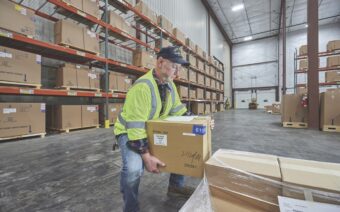
August 26, 2024
GREEN BAY – It’s no secret that childcare has become a growing concern in Wisconsin.
In fact, Eric DeKorne – vice president of membership at the Greater Green Bay Chamber (GGBC) – said child care has become one of the most discussed topics among businesses in the area.
This, DeKorne said, prompted the chamber to create an event to bring businesses together to share their experiences and gain insights as to how they can help solve the issue.
“At the GGBC, we’re certainly not experts when it comes to discussing childcare, but what we do really well is convene businesses, industries and subject matter experts,” he said.
Though the topic has been brought up on multiple occasions over the last several years, DeKorne said it has become a more pressing conversation as of late – with childcare affecting employee attraction, retention and other workforce challenges.
That’s why, he said, GGBC is hosting the first Wisconsin Childcare Summit – presented by American Family Insurance – from 8 a.m. to 3 p.m. Sept. 11 at the Resch Expo.
“We thought there was an opportunity for us to host the summit and bring businesses and subject matter experts, or those that have the expertise, knowledge or research – in and about childcare – together,” he said.
DeKorne said businesses from across the state are welcome to attend.

In addition to the summit, he said GGBC also launched the Childcare Solutions Taskforce, which continues the conversation around child care and raising awareness in the region and state.
The facts
According to the Wisconsin Economic Development Association’s report – Childcare in Wisconsin and Its Impact on Workforce and the Economy – “the long-term economic impact of Wisconsin’s childcare crisis is estimated at $4.2 billion to $6.4 billion.”
The report credits a variety of reasons for the crisis, including:
- The cost of childcare: The average family with one infant in Wisconsin spends 1/5 of their annual income on child care, while a family with an infant and four year old is spending 1/3 of their income.
- The struggle for childcare providers to hire employees: More than 80% of childcare employees have some form of higher education, but only earn $11 to $13 an hour on average, and rarely receive benefits.
- Decrease in access to care: A drop in childcare employees leads to cut hours, reduced services and, in some cases, closures. There has been a 26% decrease in the number of regulated childcare facilities in the state.
- The lack of available childcare is affecting employees’ ability to work: In Manitowoc County, 46% of people said childcare issues have impacted their ability to fully participate in the workforce. Fifty-eight percent of those people were not working – though physically able to – due to childcare problems.
- Businesses are struggling to attract and retain more employees due to lack of childcare: As mentioned before, employees unable to work due to the lack of childcare directly affects Wisconsin employers. Fifty-eight percent of employers also said the childcare problem has become worse since the COVID-19 pandemic.
Additionally, according to Raising Wisconsin, 50% of the state is in a childcare desert – which means there are more than three children under the age of five for every available childcare spot.
The summit
DeKorne said a few different activities will be taking place at the summit next month.
Joseph Fuller, a professor of management practice at the Harvard Business School, is the keynote speaker for the event.
“He’s done a lot of research around childcare and different workforce-related topics,” DeKorne said.
Participants will also have the chance to hear from Susan Longworth, policy advisor with the Federal Reserve Bank of Chicago.
“We’re hoping between Professor Joseph Fuller and (Policy Advisor Susan Longworth, there will be an) opportunity to help businesses understand the economics and the potential economic impact of what the childcare landscape could have on businesses,” DeKorne said.
The final piece of the summit, he said, is an employer panel.
Here, DeKorne said, participants will have an opportunity to hear directly from different businesses in the state – what they’re seeing and experiencing and how they’re trying to respond to the childcare situation as it pertains to employee retention and attraction.
“We really want it to be a business-centric approach,” he said. “We’re trying to be mindful that our audience is businesses, and trying to help give them information to learn about the economic impact, and also what the impact could have on their workforce retention and attraction strategies.”
The businesses’ perspective
Sachin Shivaram, CEO of Wisconsin Aluminum Foundry (WAF) and member of the Childcare Solutions Taskforce, said the foundry is no stranger to the childcare crisis.
So much so, that Shivaram said he’s experienced the stress of finding child care firsthand.
“In our household, my wife and I both work, and I can tell you from firsthand experience that securing good care for our two children has been the most stressful aspect of our lives,” he said. “We have gone through moments where we couldn’t find care, (and there’s) stress that comes along with that – worrying what might happen to our jobs.”
Wisconsin, Shivaram said, has a high rate of two-parent working families with “child care a critical enabler for that.”
But, as mentioned before, a lack of accessible child care can also lead to more parents staying at home to care for their children.
Shivaram said WAF has attempted to work on several ways to address the lack of quality and affordable child care in the community, but “unfortunately, we haven’t really found a solution.”
“If we are going to address this issue at its systemic causes, we need to work with a public-private coalition of businesses and agencies who care about this issue like we do,” he said.
To try and ease the stress of child care for its employees, Shivaram said WAF gives them $400 each month to help with the costs of care.

“Initially, we required that people have their children in licensed facilities to get the reimbursement, but we realized that there weren’t enough spots,” he said. “Now, we pay employees the reimbursement for any sort of care they have – informal, familial, etc. This is not a systemic solution, it’s more of a stopgap for our employees.”
Though the state’s current childcare climate affects both businesses and parents/employees, Shivaram said the main reason good child care is needed is “because children need high-quality care in their formative early years.”
“If we want healthy communities, we need good child care,” he said. “I honestly cannot think of a better investment in our communities, than to invest in our young children. Yes, it is a benefit to the economy if we can enable parents to work, but to me, that is a distant second to the main goal of providing a nurturing, educational environment for young children.”
Working together
One of the first steps in solving any problem is having conversations around the topic, which DeKorne said GGBC wants to help facilitate for the Northeast Wisconsin community and beyond.
“When a topic or challenge keeps coming up regularly, we’re not afraid to enter into those conversations and understand what that entails,” he said. “But then also, what are the opportunities to make positive change and impact on our community?”
The Wisconsin Childcare Summit, DeKorne said, provides a “unique opportunity to maybe widen the geographic reach a little bit.”
“We thought that this topic would be relevant to businesses throughout the state…,” he said. “We are happy to help convene a summit like this, so that businesses have the opportunity to learn more, educate themselves and better understand what the potential economic impact is to our state, for our region – but then also trying to dial it in more specifically to, ‘how could this topic be specifically impacting businesses’ ability to attract and retain employees.’”
Shivaram said with the group of businesses and speakers GGBC is bringing in, he hopes “we can start moving toward a policy-based systemic solution.”
“The chamber’s efforts to bring the government and business together to work on this is exactly what we need,” he said. “We are proud to support that effort.”
Visit greatergbc.org to learn more.
 The future of sustainable energy looks to alternative materials
The future of sustainable energy looks to alternative materials Sugar Rush by Amanda brings fresh sweetness to Suamico
Sugar Rush by Amanda brings fresh sweetness to Suamico








